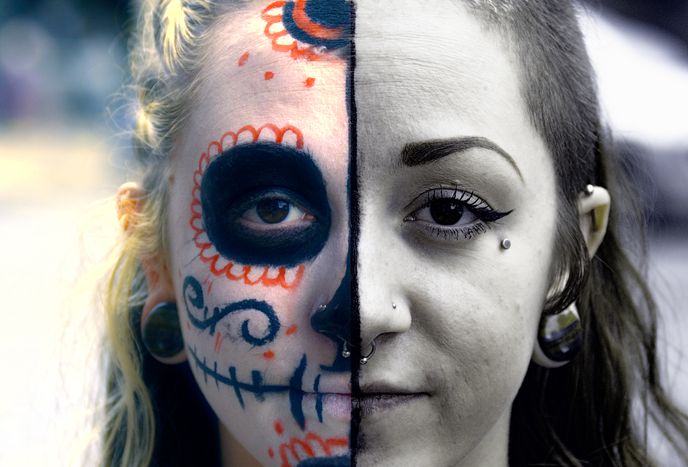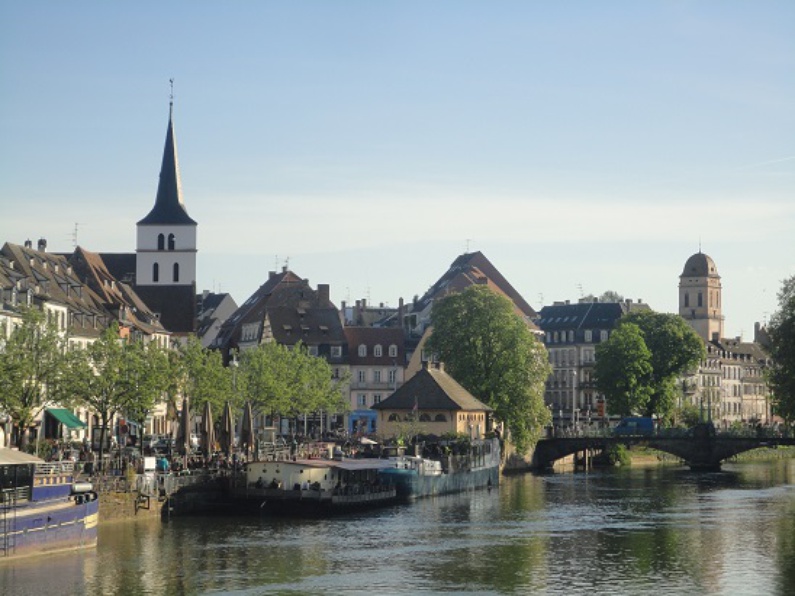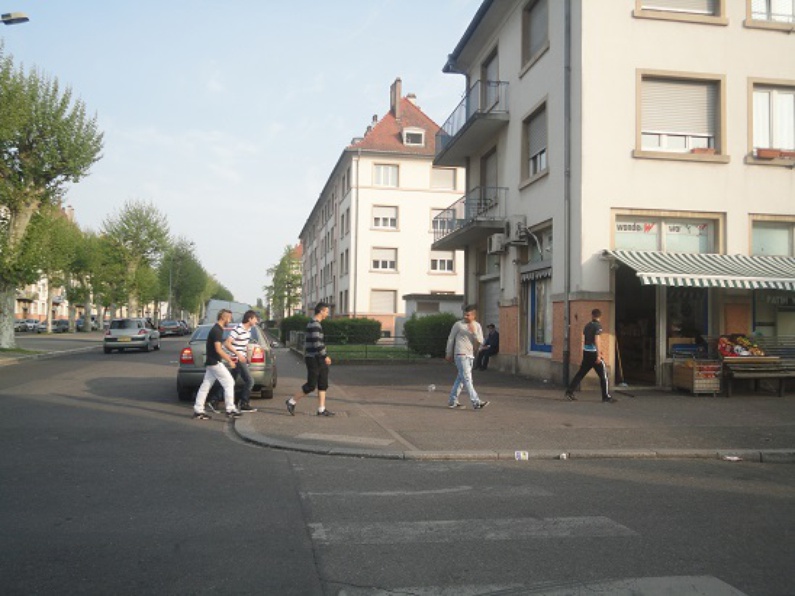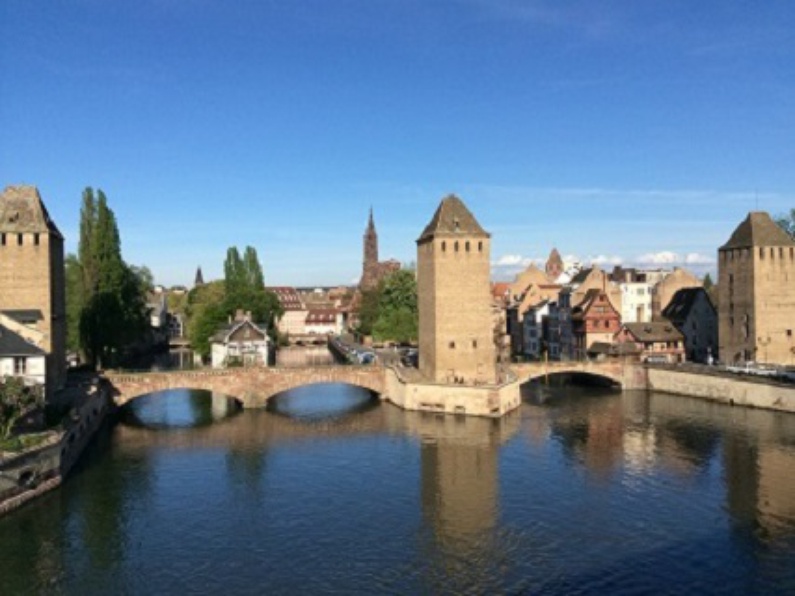
Strasbourg: The Schizophrenic City
Published on
The centre of Strasbourg is pretty and calm. The city hosts the European Parliament and exudes prosperity. But this facade conceals a darker side. Youth unemployment is sky high, drug problems have exploded, hundreds rely on a soup kitchen and many are forced to move away in search of a better life...
As the sun sets into the river Ill, the gothic timber-framed buildings that characterize the UNESCO World Heritage city centre are reflected in the tranquil waters. Young people cycle along the river bank. Many continue to stroll the cobble-stoned paths or drink a beer in one of the many welcoming bars around the centre. Strasbourg appears as lively and energetic at night as it does in the day. It is one of the cities with the youngest populations in Europe. Yet with youth unemployment reaching 23%, it still remains a vibrant and multicultural European capital. It is almost as if the thousands of youngsters that flood the city face no problems. But is that really true?
 With a population of just 272, 000, Strasbourg hosts one of the two European Parliaments, as well as the European Court of Human Rights and the Council of Europe, with many other EU agencies having their headquarters here too. Situated at the crossroads of Europe, on the border with Germany, its residents can often speak French, German and English interchangeably, one of the few European cities that can boast fluent use of the three EU working languages. But do all the inhabitants feel so European?
With a population of just 272, 000, Strasbourg hosts one of the two European Parliaments, as well as the European Court of Human Rights and the Council of Europe, with many other EU agencies having their headquarters here too. Situated at the crossroads of Europe, on the border with Germany, its residents can often speak French, German and English interchangeably, one of the few European cities that can boast fluent use of the three EU working languages. But do all the inhabitants feel so European?
Thomas Boullu works for SOS Aide aux Habitants, an organization which offers legal aid to young people who face problems with mounting debt and/or criminality. He says that those living in suburbs like Neuhof “don’t even know what the EU is”, let alone what opportunities it offers. A visit to Neuhof, half an hour south on the futuristic city tram reveals how different the suburbs are to the city centre. The franco-gothic medieval charm Strasbourg is famed for seems a world away. Elegant churches and shiny European institutions give way to run down apartment blocks. A sense of uncertainty hangs heavy in the air. The EU prestige of Strasbourg is evidently not present beyond the centre.
Neuhof is one of Strasbourg’s most troubled districts. With youth unemployment rising, and no state aid for under-25s, the young are desperate. Drug trafficking becomes widespread in such neighbourhoods. 26 young people were arrested in October 2012 for being involved in a vast drug trafficking network that had taken over the Neuhof suburb. “The court’s response was up to ten years in jail for some of these youngsters” says Boullu, noting that most of them were under-25s caught in possession of large amounts of drugs (heroin, cannabis, cocaine, etc). Some youngsters were selling heroin from their scooters. The court is “aggressive” in such cases, continues Boullu, his voice conveying a sense of gravity.
 “Such cases are very difficult” says Boullu gloomily. The issue is how to overcome the sense of division and isolation that separates such neighbourhoods from other more prosperous ones close to the centre. “The difficulties begin at age 15,” he explains, “when youngsters decide they cannot or don’t want to continue their studies. They try to find an apprenticeship, but if they don’t succeed in that they are doomed”, and their life goes downhill as they are mounted with debts, insecurity and instability, leading them into desperate situations.
“Such cases are very difficult” says Boullu gloomily. The issue is how to overcome the sense of division and isolation that separates such neighbourhoods from other more prosperous ones close to the centre. “The difficulties begin at age 15,” he explains, “when youngsters decide they cannot or don’t want to continue their studies. They try to find an apprenticeship, but if they don’t succeed in that they are doomed”, and their life goes downhill as they are mounted with debts, insecurity and instability, leading them into desperate situations.
Brigitte Ludmann works for Réseau Express Jeunes, an organization which helps young people to find jobs abroad in Germany. The Baden-Württemberg region is only 45 km away and has youth unemployment of just 2.8%. She sighs as she explains that the difficulties faced by the youth today lead them to seek any kind of opportunity, simply to have something to do. “At the beginning of the crisis we had to search for people, now we have to reject applications”. The EU programmes that offer young people an opportunity for a short-term internship with companies abroad don’t necessarily lead to a permanent job. “But it is a first step for mobility to other countries, cultures and languages, and greatly helps in motivating people and building their self-esteem”, says Ludmann.
But Ludmann says it is not so easy for young people to get up and leave. And it is not just the beauty of Strasbourg that binds them. “It is the cultural barriers that make it difficult. The different language. And the fact that money affects the perception of what it means to be abroad.” With a sadness in her voice she adds that the youngsters in the countryside are the ones who become more nationalistic and who believe it would be better to be outside the EU altogether.
 Just opposite one of the most dominant and majestic buildings in Strasbourg, the Palais Rohan, there is something you would never expect. Ludmann tells me to put away my pen and notebook as we enter the soup kitchen hosted by L’Étage – a 30-year old organization which helps young people who are unemployed or homeless. 45 workers and 30 volunteers provide meals, as well as helping with accommodation for the 18-25 year-olds who have suddenly found themselves lost. Youngsters receive a plate of warm food with a mixture of relief and despair in their eyes. You can’t tell if it is the hunger or the shame that causes them to concentrate so intently on the food before them, but all the while they still offer a kind smile to the person sitting next to them. Despite the challenges they face they seem to remain impressively calm and in good spirits.
Just opposite one of the most dominant and majestic buildings in Strasbourg, the Palais Rohan, there is something you would never expect. Ludmann tells me to put away my pen and notebook as we enter the soup kitchen hosted by L’Étage – a 30-year old organization which helps young people who are unemployed or homeless. 45 workers and 30 volunteers provide meals, as well as helping with accommodation for the 18-25 year-olds who have suddenly found themselves lost. Youngsters receive a plate of warm food with a mixture of relief and despair in their eyes. You can’t tell if it is the hunger or the shame that causes them to concentrate so intently on the food before them, but all the while they still offer a kind smile to the person sitting next to them. Despite the challenges they face they seem to remain impressively calm and in good spirits.
“You are always surprised by what you see here,” says Ludmann as she greets the volunteers. “It is not just the unskilled that are here, it is also the educated ones that reach such conditions without knowing why.” The organization helped 40 young people when it first began, but now it supports 600-1000 people.
 As I walk along the river bank gazing at the swans gliding across the water and guided by the ever-present Cathedral protruding above the remarkable buildings, taking care not to be run over by one of the hundreds of bikes that roam the centre, it becomes so obvious why youngsters choose to stay in Strasbourg. Now if only the MEPs gathering in their imposing building just a few miles away could eventually vote on a directive to create jobs rather than simply forcing the youth to leave their homes in search of something better elsewhere.
As I walk along the river bank gazing at the swans gliding across the water and guided by the ever-present Cathedral protruding above the remarkable buildings, taking care not to be run over by one of the hundreds of bikes that roam the centre, it becomes so obvious why youngsters choose to stay in Strasbourg. Now if only the MEPs gathering in their imposing building just a few miles away could eventually vote on a directive to create jobs rather than simply forcing the youth to leave their homes in search of something better elsewhere.
THIS ARTICLE IS PART OF A SPECIAL SERIES DEdicated TO Strasbourg. IT'S PART OF EUTOPIA: TIME TO VOTE, A PROJECT RUN BY CAFÉBABEL IN PARTNERSHIP WITH THE HIPPOCRÈNE FOUNDATION, THE EUROPEAN COMMISSION, THE MINISTRY OF FOREIGN AFFAIRS AND THE EVENS FOUNDATION.





